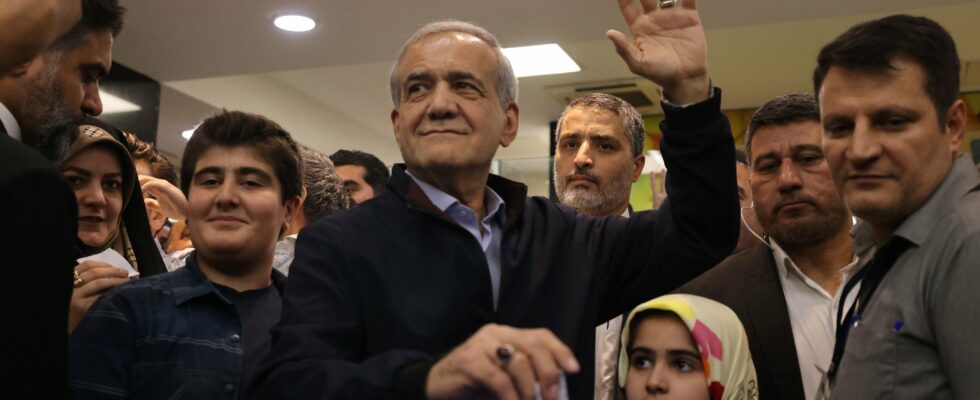The result of the first round of the Iranian presidential election was unexpected. The second round, which will take place on July 5, will pit the reformist candidate Massoud Pezeshkian against the ultraconservative Said Jalili. He will be the successor to President Ebrahim Raisi, who died on May 19 in a helicopter crash.
Virtually unknown when he entered the race, Massoud Pezeshkian won 42.5% of the vote on Friday, compared to 38.6% for Said Jalili, close to the Supreme Leader, Ayatollah Ali Khamenei. Nevertheless, abstention, which reached a record level, at nearly 40%, according to the authorities, is the big winner of this first round of voting. “In one of the most competitive presidential elections, where reformists and conservatives entered the game with all their might, a majority of 60% of Iranians are done with the reformists and conservatives,” observed Iranian economist Siamak Ghassemi on social networks. Of the 60 million voters called to the polls, only 24 million turned out in a country hit by an economic crisis, with inflation at 40% and shaken by a deadly repression of any protest movement.
Opening to the West
A member of parliament for the city of Tabriz, a major city in northwestern Iran, and a heart surgeon by profession, Massoud Pezeshkian, 69, is proposing a programme that is very different from his conservative opponent, although this is not a fundamental break. The world observes that “the candidate did not cross any red lines during his speeches, in his meetings and on the sets of Iranian television, constantly repeating his absolute loyalty to the Supreme Guide, Ali Khamenei, the greatest authority of the country and the greatest obstacle standing in the way of any change in Iran.
The candidate, now in the running for the second round, however, surprised during a televised debate. “Are we supposed to be eternally hostile to America or do we aspire to resolve our problems with this country?” he said in front of five other conservative candidates. “Statistics show that every time we reach an agreement [avec l’Occident]inflation is decreasing and economic growth is increasing again,” he added, quoted by the Iranian newspaper Hamshahri. “We will be neither anti-West nor anti-East,” he declared several times during his campaign, hoping that Iran would come out of its “isolation”.
He promised to negotiate directly with Washington to revive the Iranian nuclear talks, which have been stalled since the US withdrawal in 2018. “If we manage to lift the American sanctions, people will have a more comfortable life,” he said. Opposing him, candidate Said Jalili, 58, is in favor of an inflexible policy towards the West. He demonstrated this during the six years he led the Iranian nuclear negotiations, between 2007 and 2013.
Just after voting on Friday, the reformist candidate also told reporters that he hoped the country would maintain good relations “with all countries, except Israel,” reports The Times of IsraelSince October 7, the day of the Hamas attack on Israel that left 1,200 dead, Iran has continued to show its support for the terrorist movement.
Defense of minorities
In recent years, the reformist and moderate camp has clearly lost influence against the conservatives. Massoud Pezeshkian, however, managed to obtain the support of his heavyweights, notably former presidents Mohammad Khatami and Hassan Rouhani, as well as former Foreign Minister Javad Zarif, the architect of the nuclear agreement concluded with the major powers in 2015.
The father, who raised three children alone after his wife and another child died in a car accident in 1993, calls himself “the voice of the voiceless.” He promises to work, if elected, to improve the living conditions of the most disadvantaged.
Minister of Health from 2001 to 2005 in the reform government of Mohammad Khatami, Massoud Pezeshkian remained little known to Iranians until now. During the campaign, he denounced the use of force by the police to enforce the obligation for women to wear the veil. “We oppose any violent and inhumane behavior […] especially towards our sisters and our daughters, and we will not allow such acts to happen,” he declared. Already, in 2022, he spoke out against the lack of transparency of the authorities on the affair of Mahsa Amini, died in detention after her arrest by the morality police, who accused her of breaking the strict dress code for women.
His criticism has its limits, however. According to Reutersat a Tehran University meeting earlier this month, responding to a question about students imprisoned on charges related to anti-government protests, the candidate said that “political prisoners are not in my purview, and if I want to do something, I have no authority.”
In a video message, Massoud Pezeshkian called on his supporters to go to the polls again next week “to save the country from poverty, lies, discrimination and injustice.” However, whatever the outcome, the election is expected to have limited repercussions. In Iran, the president has limited powers and is more responsible for implementing the broad political guidelines set by the supreme leader, Ayatollah Ali Khamenei, who is the real head of state. Massoud Pezeshkian has also promised during television debates and interviews not to contest Khamenei’s policies. A foil for many Iranians from the urban middle class and young voters, who no longer seek simple reforms but now directly challenge the Islamic Republic as a whole.
